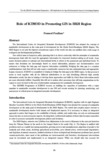Role of ICIMOD in Promoting GIS in HKH Region
JIRCAS international symposium series
| ISSN | 13406108 |
|---|---|
| NII recode ID (NCID) | AA1100908X |

Full text
intlsymp-8_59-68.pdf879.52 KB
The International Centre for Integrated Mountain Development (ICIMOD) has adopted the concept of sustainable development as the main goal of development for the Hindu Kush-Himalayan (HKH) Region. The HKH Region is not only the highest mountainous region of the world, but also one saddled with a wide range of ecological and developmental problems.
One critical issue in long-term policy planning that is in direct conformity with the principles of sustainable development deals with the need for appropriate information for improved decision-making at all levels – from senior decision-makers at national and international levels to others at the grassroots and individual levels. To ensure that decisions are increasingly based on sound information, planners and decision-makers must endeavour to bridge the data gap and improve information availability. Bridging the data gap is a complex multidisciplinary task that will not only require considerable resources but also substantial time and appropriate human resources. ICIMOD is committed to helping to bridge the data gap in the HKH region. In this process it seeks to work together with all the different stakeholders in not only identifying different high priority information needs, but also in helping to develop those approaches and skills by which these information needs are most effectively fulfilled. Hopefully this will set in motion other processes that will help organizations in the region to move forward in this area of information management for sustainable development.
The MENRIS Programme of ICIMOD focuses on building the capacities of institutions with a major mandate in sustainable mountain development to use GIS and remote sensing for planning, monitoring, and assessment of critical areas in integrated mountain development.
One critical issue in long-term policy planning that is in direct conformity with the principles of sustainable development deals with the need for appropriate information for improved decision-making at all levels – from senior decision-makers at national and international levels to others at the grassroots and individual levels. To ensure that decisions are increasingly based on sound information, planners and decision-makers must endeavour to bridge the data gap and improve information availability. Bridging the data gap is a complex multidisciplinary task that will not only require considerable resources but also substantial time and appropriate human resources. ICIMOD is committed to helping to bridge the data gap in the HKH region. In this process it seeks to work together with all the different stakeholders in not only identifying different high priority information needs, but also in helping to develop those approaches and skills by which these information needs are most effectively fulfilled. Hopefully this will set in motion other processes that will help organizations in the region to move forward in this area of information management for sustainable development.
The MENRIS Programme of ICIMOD focuses on building the capacities of institutions with a major mandate in sustainable mountain development to use GIS and remote sensing for planning, monitoring, and assessment of critical areas in integrated mountain development.
| Creator | Pramod Pradhan |
|---|---|
| Publisher | Japan International Research Center for Agricultural Sciences |
| Available Online | |
| Issue | 8 |
| spage | 59 |
| epage | 68 |
| Language | eng |
